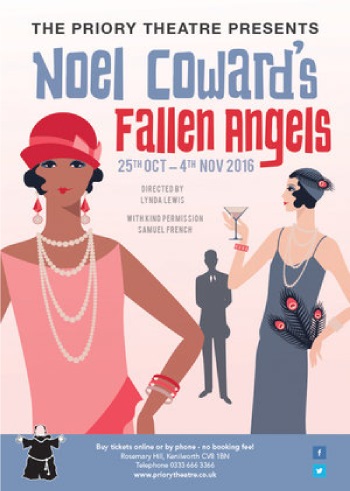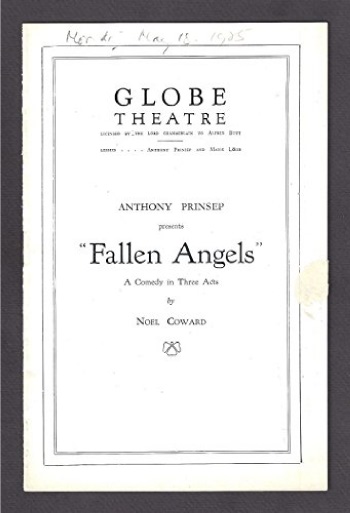
Fallen Angels
Priory Theatre, Kennilworth
****
JUST the
briefest glance at the opening set for
Fallen Angels
gave one the feeling this was going to be a worthwhile evening.
Baby grand piano, sideboard and drinks,
fireplace, curtained window, elegantly arched rear entrance, elegant tea
table, chaise longue, paintings on the wall
 (landscapes,
but one looking – from where I sat - like a Modigliani), four varied
plants, appealingly decorative (later elaborated into six), subtly
angled walls with a sort of quasi-Regency wallpaper. (landscapes,
but one looking – from where I sat - like a Modigliani), four varied
plants, appealingly decorative (later elaborated into six), subtly
angled walls with a sort of quasi-Regency wallpaper.
Planning had gone into all this, as it had into
this entire production. Remarkable that all this onstage material left
plenty of room for gallivanting. Set Designers were Nigel Macbeth and
Richard Poynter, Plus additional cheers for the three-man Props team.
Fallen Angels
is perhaps predictable Noël Coward. Husbands fall into a rage about
nothing, the past – or presumed past - comes back to haunt rocky
marriages, the wives – best friends – have tiffs and then tumble into a
major row; the difference between ‘loving’ and ‘being in love’ is
demarcated; and everyone has to put up with the pert, know-all maid, who
mischievously wraps them round her little finger.
There’s not a lot more than that, but Coward puts
his finger on the complete futility of petty arguments and trivial
jealousies, as if to underline their complete pointlessness. What they
do imply, however, is the growing tedium of a marriage after a few
years: the fading of passion (‘It’s so uncomfortable, isn’t it,
passion?’) and the aching for something to replace it, as the two wives
willingly concede given that ‘rampant ecstasy subsides’.
The husbands make their presence briefly felt:
Frederick or Fred (Chris Cortopassi) at the outset and later William
(Ben Wakeling), colourfully kitted out for golf which the two of them
head off for, relieved to be out and about. This leaves the two girls,
Julia (Natasha Lewis) and Jane (Mahalia Carroll) on their own to frolic,
interrupted with increasingly hilarious regularity by Jasmine Saunders
(or ‘Saunders’, played by Teresa Robertson), the maid.
Robertson is new to the Priory, but what a catch
she proved. As Julia awkwardly strums the piano (with a delicious
tentativeness: nice Sound Design from Arthur Marshall, with June Curry
offering Music Tuition – presumably in how to do it haltingly as well as
smoothly) the maid sticks her nose in and goes one – or two – better.
If a song is in French, Saunders knows how to
enunciate that much more artfully. She was, as it happens, ‘in the
desert with the Red Cross’; plus not to mention, when there are drinks
to mix, a barmaid. Critical, judgmental, presumptuously posh-spoken, she
potters around the stage – her own domain, as she sees it - nose turned
up, as hilariously and snootily as Freddie Frinton.
But the bulk of Act I, indeed of the whole play,
falls on the two women, Julia and Jane, played like old school chums
who’ve known each other for ever – and still much given to laughter, confiding, suppressed resentment
and, at the high points, downright, out and out bitchiness.
– and still much given to laughter, confiding, suppressed resentment
and, at the high points, downright, out and out bitchiness.
Two things helped them shoulder such a weighty
amount of text, shifting moods and ear-battering explosions. One was the
costumes (Mike Brooks) - beautifully 1920s (Coward first staged it in
1925), not just elegant for both girls but really rather beautiful, and
changed for Act 2. Why so very successful? The Priory retains its own
wardrobe, clearly full of gems, and has the able hands armed with the
keen intelligence to adapt them where necessary. .
The playbill for the original production in 1925
The other was surely all down to the Director,
Linda Lewis, also mounting her first show for the Priory. The moves,
especially Julia’s in the early stages, but actually the female
characters throughout the evening, even the circling way Saunders pours
the champagne (going the ‘long’ way round) were splendidly mapped,
natural, apt but also creative. And together with Julia’s striding up
and down or Jane’s flouncing, the moves generated the pace, which was
beautifully concocted, so that the whole evening, riddled with snide
Coward humour, never lost its forward momentumNatasha Lewis’s Julia was
something of a revelation. Her facial expressions – eagerness,
determination, disappointment, desperation, exasperation, infuriation –
seemed to unveil an unending flow of shifting moods. She was funny,
edgy, irritable, judgmental, constantly, fretfully on the move, not
least when annoyedly trying to reclaim her territory from the impossible
maid.
Cavorting with Jane like a pair of giggling
schoolgirls (it’s all in the script) or baring her teeth and threatening
to evict her chum when they by stages fall out (‘It’s always the same
when sex comes up; it’s rotten and beastly and it wrecks everything.’)
– that too turned out to be really quite subtly
paced. Lewis gave a treat of a performance, invariably genuinely clever,
and most impressive for both its range and its joyous, nervy,
edge-of-seat unpredictability.
Mahalia Carroll’s Jane
came close to matching Lewis. When they begin to get tipsy, it’s Carroll
who leads the way, making a fine job of getting squiffy and clumsy and
dopy which was actually rather neatly observed. She has some nice
ripostes (Julia: ‘To put it bluntly, we’re both up for a lapse.’ Ja ne:
‘No, dear, it’s a relapse.’
‘Several drinks do no harm. It’s only the first that’s dangerous’); and
pulls off a remarkable bout of coughing and spluttering (from
reluctantly downing Benedictine) that sounded blissfully genuine. ne:
‘No, dear, it’s a relapse.’
‘Several drinks do no harm. It’s only the first that’s dangerous’); and
pulls off a remarkable bout of coughing and spluttering (from
reluctantly downing Benedictine) that sounded blissfully genuine.
The point is, and the cause of their falling out,
all centres round an old flame of both of them, Maurice Duclos. They can
laugh about him and alternately relish and dismiss him, and engage in
endless chatter about him, but the fact is that both clearly fancied him
and have an appetite for the idea of being fancied again.
Edna Best, as Jane, Austin Trevor as Maurice
and Tallulah Bankhead as Julia in the original 1925 London production.
In fact nothing has happened – the chap, who is
expected, hasn’t even turned up yet, though it opens the way to a in the
lot of comedy regarding incoming telephone calls and pointless answering
of the front door.
One of many highlights of this girlie tussle is
when the two get wrapped up in the telephone wire – witty rather than
corny because as they get more enmeshed, in a neat piece of dramatic
irony, neither of them realises what’s happening.
But when the husbands return from the fairway,
they walk straight into this bizarre situation – their wives’ mutual
enthusiasm for someone the existence of whom neither man had any idea –
and ructions follow. The fact that nothing has ‘happened’ – the men fear
the worst – only serves to make these exchanges all the more aggravated,
and of course render the men all the more silly.
But while the two husbands made a good job, in
their different ways, of being flummoxed, then violently jealous, then
positively explosive, it was the elegant performance of Richard Terry as
the much maligned and attractively benevolent Maurice Duclos that really
gave the edge to this final scene. His refined manner, tender treatment
of both women and understanding outlook innocent of all presumption,
made this small role the catalyst not for disaster, but for
reconciliation.
So – a play of much wit and levity, variety, and
a production full of invention, wry humour and amid the human
explosions, riddled with audience guffaws. Great fun. To 04-11-16
Roderic Dunnett
26-10-16
|

